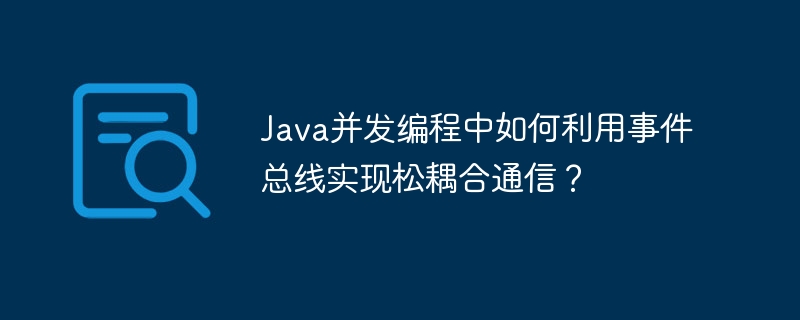Home >Java >javaTutorial >How to use event bus to achieve loosely coupled communication in Java concurrent programming?
How to use event bus to achieve loosely coupled communication in Java concurrent programming?
- WBOYWBOYWBOYWBOYWBOYWBOYWBOYWBOYWBOYWBOYWBOYWBOYWBOriginal
- 2024-04-30 16:45:021043browse
The event bus implements loosely coupled communication in Java concurrent programming, allowing components to subscribe to and publish events through the message passing mechanism. Components can subscribe to or publish events. When an event is published, the event bus delivers it to all subscribed components. Components can exchange information without direct communication, improving system flexibility, scalability, and maintainability.

Event bus in Java concurrent programming implements loosely coupled communication
Introduction
Loose coupling is one of the key principles when designing distributed systems. It allows components to be developed and deployed independently without knowing each other's internal implementation. In Java concurrent programming, event bus is an effective way to achieve loosely coupled communication.
What is an event bus?
The event bus is a messaging mechanism that allows components to subscribe to and publish events. When an event is published, the event bus delivers it to all components that subscribe to the event. This allows components to exchange information without communicating directly.
Event bus implementation in Java
There are many Java libraries that provide event bus implementation, for example:
- EventBus
- Guava EventBus
- Spring Framework
- RxJava
Practical Case
Let us create a simple example to Describes how to use EventBus to achieve loosely coupled communication. **
Step 1: Create event
public class MyEvent {
private String message;
public MyEvent(String message) {
this.message = message;
}
public String getMessage() {
return message;
}
}Step 2: Create subscriber
public class MySubscriber {
@Subscribe
public void handleEvent(MyEvent event) {
System.out.println("Received event: " + event.getMessage());
}
}Step 3 :Publish event
EventBus eventBus = new EventBus();
eventBus.register(new MySubscriber()); // 注册订阅者
eventBus.post(new MyEvent("Hello, world!")); // 发布事件Run output
Received event: Hello, world!
Conclusion
The event bus is a loose implementation in Java concurrent programming A powerful tool for coupled communication. They allow components to exchange information without communicating directly, thereby increasing system flexibility, scalability, and maintainability.
The above is the detailed content of How to use event bus to achieve loosely coupled communication in Java concurrent programming?. For more information, please follow other related articles on the PHP Chinese website!

